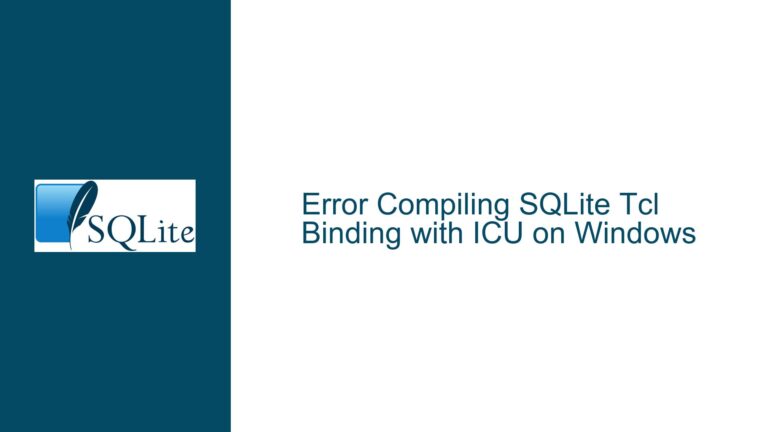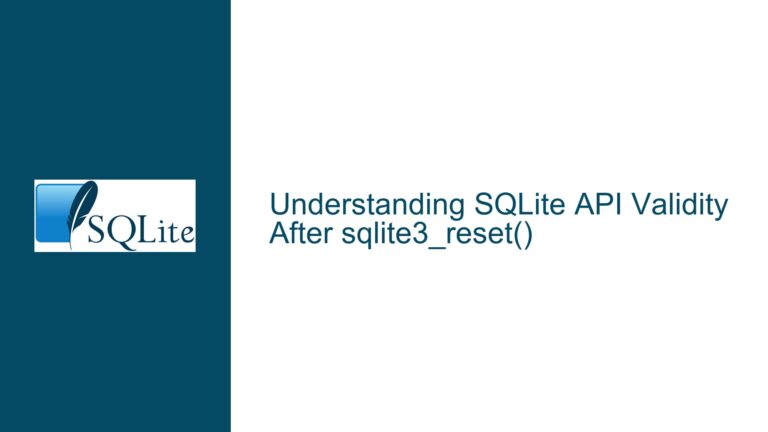Binding SQLite3_stmt Across Threads: Concurrency Risks and Solutions
Understanding SQLite3_stmt Thread Safety and Concurrent Binding
SQLite’s sqlite3_stmt object represents a prepared statement—a precompiled SQL query that can be efficiently executed multiple times with varying parameter values. A common question arises in multithreaded applications: Can a single sqlite3_stmt instance be shared across threads for concurrent parameter binding and execution? The short answer is no, but the reasoning involves nuanced interactions between SQLite’s threading model, connection-specific resources, and the lifecycle of prepared statements.
Core Concepts: Connections, Statements, and Threading
Connection-Specific Statements:
Asqlite3_stmtis tied to thesqlite3database connection that created it. SQLite connections are not inherently thread-safe unless configured with specific threading modes. Even then, sharing a statement across threads violates the ownership model.Binding Parameters:
Binding parameters (e.g.,sqlite3_bind_text()) modifies the internal state of thesqlite3_stmtobject. If two threads attempt to bind parameters simultaneously, they corrupt the statement’s internal state, leading to race conditions.Execution Flow:
The sequencebind → step → resetis stateful. For example:sqlite3_step()executes the statement and advances through results.sqlite3_reset()returns the statement to a "ready" state but retains bound parameters unless explicitly cleared.
Concurrent access disrupts this flow, causing undefined behavior such as partial result sets or misaligned execution states.
Threading Modes:
SQLite supports three threading modes:- Single-thread: Disables all mutexes.
- Multi-thread: Allows connections to be used across threads but not simultaneously.
- Serialized: Fully thread-safe via mutexes but incurs performance overhead.
The default mode (
SQLITE_THREADSAFE=1) allows multi-threaded use with restrictions. UsingSQLITE_OPEN_FULLMUTEX(serialized mode) enables safe concurrent access to a connection but does not eliminate the need for proper statement management.
Why Concurrent Binding Fails
When threads share a sqlite3_stmt:
- Race Conditions in Binding: Thread A may bind a parameter value, but Thread B overwrites it before Thread A calls
sqlite3_step(). This results in "last write wins" behavior, where the final bound value is unpredictable. - Interleaved Execution: If Thread A is in the middle of
sqlite3_step(), Thread B callingsqlite3_reset()orsqlite3_bind_*()corrupts the statement’s execution context. - Transaction Conflicts: SQLite uses connection-level transactions. If two threads share a connection and attempt conflicting operations (e.g., one starts a write transaction while another is mid-query), the database locks or returns
SQLITE_BUSY.
Why Concurrent Binding to a Shared Prepared Statement Fails
1. Statement State is Not Thread-Local
The sqlite3_stmt object stores execution state, including bound parameters, cursor positions, and error codes. This state is mutable and not isolated per thread. For example:
- Binding Collisions: Two threads binding parameters to the same statement clobber each other’s values.
- Implicit Reset on Reuse: After
sqlite3_step()returnsSQLITE_DONE, the statement must be reset before reuse. If Thread A resets the statement while Thread B is still processing results, Thread B’s subsequent operations fail.
2. Connection-Level Locking
SQLite uses file-level or database-level locks to manage concurrency. When a statement is executed:
- A read lock is acquired for
SELECTqueries. - A write lock is acquired for
INSERT,UPDATE, orDELETE.
If two threads share a connection, they compete for these locks, leading to SQLITE_BUSY errors. Even in serialized mode, the connection’s internal mutex serializes access, negating concurrency benefits.
3. Transaction Boundaries
Transactions in SQLite are connection-scoped. Consider this scenario:
- Thread A begins a transaction with
BEGIN IMMEDIATE. - Thread B attempts to bind and execute a statement on the same connection.
- Thread B blocks until Thread A’s transaction completes, creating a bottleneck.
This violates the principle of allowing independent progress across threads.
4. Undefined Behavior in Mixed Operations
Mixing API calls from multiple threads without synchronization leads to:
- Use-After-Reset: Thread A calls
sqlite3_reset(), invalidating Thread B’s in-progresssqlite3_step(). - Partial Binding: A thread might bind only some parameters before another thread hijacks the statement, leading to incomplete or incorrect queries.
Implementing Thread-Safe SQLite Prepared Statement Binding
1. Use One Statement Per Thread
Solution: Each thread should create and manage its own sqlite3_stmt instances.
- Preparation: Call
sqlite3_prepare_v3()within the thread that will use the statement. - Lifetime: Ensure the statement is finalized (
sqlite3_finalize()) in the same thread.
Example Workflow:
void* thread_func(void* arg) {
sqlite3* db;
sqlite3_open("test.db", &db);
sqlite3_stmt* stmt;
sqlite3_prepare_v3(db, "INSERT INTO t1 VALUES(?)", -1, 0, &stmt, NULL);
// Bind, step, reset within this thread only
sqlite3_finalize(stmt);
sqlite3_close(db);
return NULL;
}
2. Adopt a Connection-Per-Thread Model
Solution: Assign each thread its own sqlite3 connection.
- Isolation: Connections are independent, avoiding lock contention.
- Configuration: Use
SQLITE_OPEN_FULLMUTEXif connections are reused across threads.
Caveats:
- Memory Overhead: Each connection consumes memory (≈1-2MB).
- Write-Ahead Logging (WAL): Enable WAL mode (
PRAGMA journal_mode=WAL;) to allow concurrent reads and writes across connections.
3. Serialize Access with Mutexes
Solution: Use external mutexes to guard statement usage.
- Coarse-Grained Locking: Wrap the entire
bind → step → resetsequence in a mutex. - Fine-Grained Locking: Only protect critical sections (e.g., binding).
Example (Coarse-Grained):
pthread_mutex_t stmt_mutex = PTHREAD_MUTEX_INITIALIZER;
void* thread_func(void* arg) {
pthread_mutex_lock(&stmt_mutex);
sqlite3_bind_text(stmt, 1, "value", -1, SQLITE_STATIC);
while (sqlite3_step(stmt) == SQLITE_ROW) { /* ... */ }
sqlite3_reset(stmt);
pthread_mutex_unlock(&stmt_mutex);
return NULL;
}
4. Avoid Shared Connections in High Concurrency
Anti-Pattern:
// Global connection shared by all threads
sqlite3* global_db;
Correct Approach:
// Thread-local storage for connections
thread_local sqlite3* thread_db = NULL;
void init_thread_db() {
if (!thread_db) sqlite3_open("test.db", &thread_db);
}
5. Leverage SQLite’s Thread-Safe Modes
Configuration:
- Open connections with
SQLITE_OPEN_FULLMUTEXto enable serialized mode:sqlite3_open_v2("test.db", &db, SQLITE_OPEN_READWRITE | SQLITE_OPEN_CREATE | SQLITE_OPEN_FULLMUTEX, NULL);
Trade-offs:
- Performance: Serialized mode adds overhead due to mutex contention.
- Complexity: Requires rigorous error checking for
SQLITE_BUSYandSQLITE_LOCKED.
6. Reset Statements Before Reuse
Best Practice:
- Always call
sqlite3_reset()after finishing with a statement. - Clear bindings explicitly with
sqlite3_clear_bindings()if reusing a statement with different parameters.
Example:
sqlite3_reset(stmt);
sqlite3_clear_bindings(stmt);
sqlite3_bind_int(stmt, 1, new_value);
7. Use Thread Pooling with Connection Pooling
Advanced Strategy:
- Maintain a pool of connections and statements.
- Assign threads to "check out" a connection and statement from the pool.
Benefits:
- Reduces overhead from creating connections per thread.
- Ensures thread-safe reuse of prepared statements.
8. Transaction Management in Multithreaded Environments
Guidelines:
- Use
BEGIN IMMEDIATEorBEGIN EXCLUSIVEfor write transactions to avoid deadlocks. - Keep transactions short to minimize lock contention.
Example:
sqlite3_exec(db, "BEGIN IMMEDIATE", NULL, NULL, NULL);
// Perform writes
sqlite3_exec(db, "COMMIT", NULL, NULL, NULL);
9. Debugging Common Concurrency Issues
Symptoms:
SQLITE_MISUSE: Indicates concurrent access to a statement or connection.SQLITE_BUSY: A thread is holding a lock another thread needs.
Tools:
- Enable SQLite’s internal debugging with
SQLITE_DEBUG. - Use thread sanitizers (e.g., Clang’s
-fsanitize=thread).
10. Alternatives to Shared Statements
Batch Processing:
- Collect data from threads and process it in bulk on a single thread.
Asynchronous Queues:
- Use a producer-consumer pattern where worker threads push tasks to a queue, and a dedicated database thread processes them.
By adhering to these principles, developers can avoid the pitfalls of concurrent sqlite3_stmt usage while leveraging SQLite’s efficiency in multithreaded applications. The key takeaway is that prepared statements are not thread-safe by design, and any sharing across threads requires rigorous synchronization or isolation strategies.






